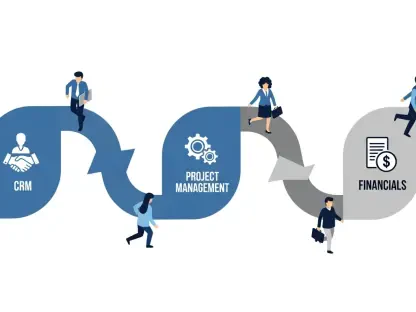Overview of the SRE and DevOps Industry
In an era where digital transformation dictates business success, the Site Reliability Engineering (SRE) and DevOps sectors stand at the forefront of ensuring seamless software delivery and infrastructure stability, evolving into critical pillars for enterprises. Driven by the exponential growth of cloud computing and the need for continuous deployment, these fields have become essential for operational resilience, especially in environments powered by Amazon Web Services (AWS), which dominates the market with its extensive suite of tools and services.
A notable shift in this landscape is the integration of artificial intelligence and automation, which are redefining how teams manage complex systems. Major players like Splunk, Datadog, and New Relic are investing heavily in AI to enhance observability, while the rise of microservices architectures adds layers of intricacy to cloud operations. This complexity demands innovative solutions that can keep pace with rapid development cycles and ensure minimal downtime, a non-negotiable priority for businesses operating in a 24/7 digital economy.
The stakes for operational efficiency and uptime have escalated as software development accelerates. Enterprises now prioritize tools that not only monitor but also predict and prevent issues before they impact end users. This growing demand for proactive management underscores the industry’s trajectory toward intelligent systems that streamline workflows and reduce human error, setting the stage for transformative entrants in the market.
AlertD’s Groundbreaking Entry and Market Positioning
Emerging Trends in Cloud Operations
The SRE and DevOps fields are witnessing a surge in demand for AI-driven automation as teams grapple with the intricacies of modern cloud environments. Manual processes, once the norm, are increasingly seen as bottlenecks, prompting a shift toward intelligent tools that can autonomously handle repetitive tasks. This trend reflects a broader industry push for solutions that integrate seamlessly with existing ecosystems, minimizing disruption while maximizing impact.
A significant development is the growing preference for user-friendly platforms that offer real-time visibility into system health. Tools that support natural-language querying are gaining traction, enabling engineers to interact with complex data without deep technical expertise in query languages. This accessibility is crucial as teams seek to reduce manual workloads and focus on strategic priorities rather than operational firefighting.
Moreover, the need for both proactive and reactive capabilities is shaping innovation in cloud operations. Companies are looking for solutions that not only troubleshoot issues after they occur but also anticipate potential failures through predictive analytics. This dual focus presents fertile ground for new players to introduce cutting-edge technologies that address the full spectrum of operational challenges.
Market Insights and Growth Potential
The SRE and DevOps market is expanding rapidly, fueled by widespread cloud adoption and the proliferation of microservices. Industry estimates suggest that the market for AI-integrated operational tools could grow at a compound annual rate of over 20% from this year to 2030, driven by the need for scalable, efficient solutions. This growth trajectory highlights a lucrative opportunity for startups that can deliver differentiated value in a crowded space.
AlertD, with its recent $3 million pre-seed funding from True Ventures, is strategically positioned to capitalize on this momentum. Its environment-agnostic platform, designed to work across various cloud providers and development lifecycles, offers versatility that appeals to mid- to large-sized enterprises. Early investor confidence signals strong potential for the company to carve out a niche among established competitors by addressing unmet needs in operational clarity and speed.
Looking ahead, AlertD has the chance to capture significant market share by focusing on tailored solutions for complex AWS environments, where many enterprises struggle with visibility and cost management. As businesses continue to scale their cloud footprints, the demand for intuitive, AI-powered tools is expected to intensify, positioning AlertD as a contender to watch in the coming years.
Challenges in Modern Cloud Operations
The landscape of cloud operations is fraught with hurdles that SRE and DevOps teams must navigate daily. One of the most pressing issues is the overwhelming volume of ticket queues, which often bog down engineers with repetitive, low-value tasks. This operational toil not only hampers productivity but also delays critical responses to system anomalies, risking downtime and customer dissatisfaction.
Another challenge lies in the shortcomings of legacy observability and monitoring tools, which struggle to match the velocity of modern software development. Many traditional solutions require extensive manual configuration, creating friction in fast-paced environments where agility is paramount. This gap between tool capability and operational demand underscores the need for more adaptive, automated systems that can evolve with infrastructure changes.
To address these pain points, strategies such as AI-driven automation and collaborative workflows are gaining prominence. By leveraging machine learning to filter noise and prioritize alerts, teams can focus on high-impact issues, while shared platforms enable better communication across departments. These approaches promise to alleviate the burden of manual processes, paving the way for more efficient and responsive operations.
Regulatory and Compliance Considerations
Cloud operations are not immune to the stringent regulatory landscape that governs data security and privacy, particularly for enterprises operating in sensitive sectors. Standards such as GDPR and CCPA impose strict requirements on how data is handled, stored, and processed, compelling SRE and DevOps teams to prioritize compliance alongside performance. This dual focus adds a layer of complexity to infrastructure management, especially in AWS environments hosting vast amounts of critical information.
Compliance is not merely a checkbox but a core component of operational strategy, as breaches can lead to severe financial and reputational damage. Enterprises must ensure that their tools and practices align with evolving regulations, a task that becomes more daunting with the integration of AI systems whose decision-making processes require transparency. Platforms that can demonstrate adherence to standards while maintaining efficiency hold a competitive edge in this environment.
AlertD, with its emphasis on secure deployment options and clear visibility into AI-driven processes, offers a potential solution to these concerns. By embedding compliance-friendly features, such as audit trails and data protection mechanisms, the platform can support enterprises in meeting regulatory demands without sacrificing operational agility. As policies continue to shift, the adaptability of such tools will likely influence their adoption across industries.
Future Outlook for AI in SRE and DevOps
The integration of AI into SRE and DevOps is poised to become a standard practice, with intelligent agents expected to evolve into indispensable tools for cloud management. These systems are anticipated to handle increasingly sophisticated tasks, from anomaly detection to automated remediation, reducing the cognitive load on human operators. This progression signals a future where AI is not just an add-on but a fundamental component of operational frameworks.
Emerging technologies, such as advanced large language models, are likely to further disrupt the industry by enabling more intuitive interactions with complex datasets. These innovations could transform how teams query and analyze infrastructure performance, making insights accessible to non-technical stakeholders as well. Additionally, the rise of always-on platforms that cater to both consumer and enterprise expectations for seamless service may drive further advancements in user experience and system reliability.
Global economic conditions and investment trends will also play a pivotal role in shaping the growth of startups in this space. While funding for tech ventures remains robust, economic uncertainties could steer investors toward solutions with proven ROI, benefiting companies like AlertD that address critical pain points. The interplay of these factors suggests a dynamic landscape where adaptability and innovation will determine long-term success.
Conclusion and Strategic Insights
Reflecting on AlertD’s debut, the launch marked a significant milestone in tackling the persistent challenges of cloud operations through AI innovation. The $3 million pre-seed funding from True Ventures stood as a testament to market confidence in the startup’s vision and its capacity to deliver meaningful impact. This financial backing provided a solid foundation for scaling efforts and refining the platform to meet diverse enterprise needs.
For industry stakeholders, the emergence of AlertD highlighted the importance of investing in AI-native tools that prioritize automation and user accessibility. Forming strategic partnerships with innovative startups offered a pathway to stay ahead in a rapidly evolving field, ensuring that operational tools kept pace with infrastructure demands. Encouraging collaboration between established firms and new entrants could foster a more resilient ecosystem.
Looking beyond immediate outcomes, the broader implication of this development pointed to a redefined approach to SRE and DevOps workflows. By championing solutions that enhanced production uptime and reduced manual effort, the industry took steps toward a future where efficiency and reliability were not just goals but guarantees. AlertD’s journey suggested a promising direction, urging continued exploration of AI’s transformative potential in operational excellence.









